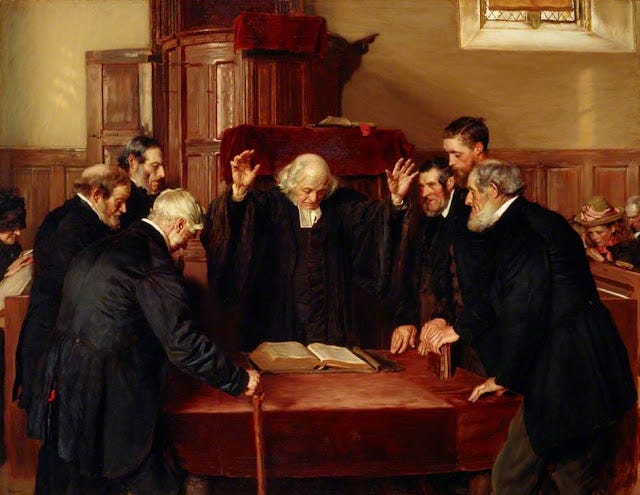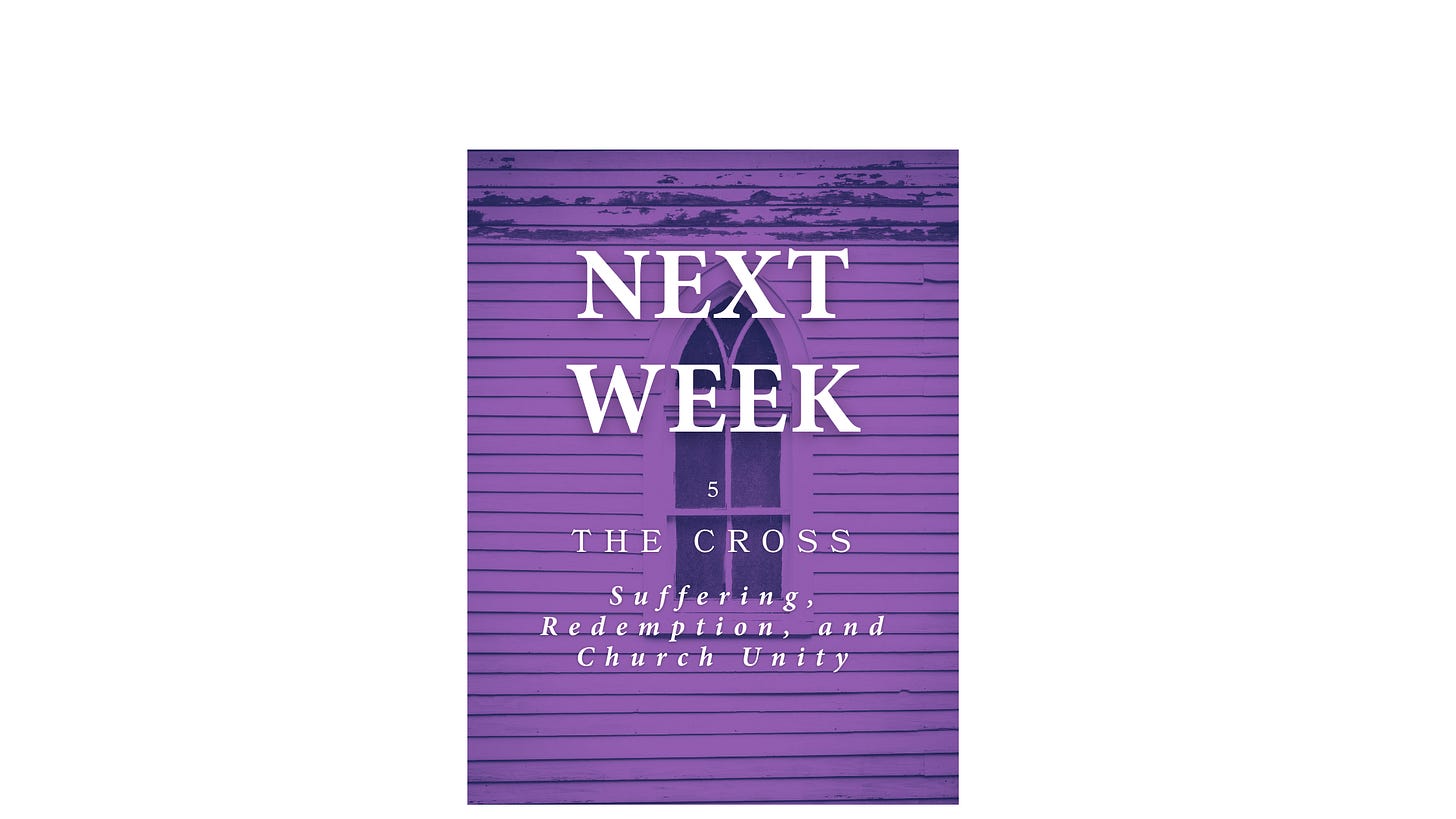The Robe
From Setting Up Chairs in Makeshift Chapels to Laying Down Crowns in Courts of Glory: Chapter Four in How Lovely Is Your Dwelling Place
The Robe
Teach us to care and not to care
Teach us to sit still
Even among these rocks,
Our peace in His will
— T. S. Eliot Ash-Wednesday
* * *
I always knew I was preaching Jesus Christ between time and eternity, heaven and hell, angelic host, and a demonic coven. That is why the Lord inscribed the verses of the Psalm—Psalm 84—on the skin of my soul. It is why whenever I looked over the congregations—in Kansas, Florida, Georgia, Tennessee, and North Carolina, and my students in seminary classes, and service members in the Armed Forces—the Spirit in my soul prompted me to soliloquy:
“Take them in, Mike; breathe this moment in and let its pure air fill the lungs of your imagination. Look at every lamb gathered to receive the Bread of life. Soon, sooner than you can suppose, you will be removed from this place you love. But I will never leave you nor forsake you.”
The creature paced in the distance, back and forth, slowly, caged until his hour arrived.
I always felt a surge of power—unction, “the Hywl,”, wind in my sails—as the Welsh say—just as I drew my breath to begin to preach. I knew the cunning cat in the distance would have his day. But I got to proclaim a Word from Another World for one glimmering moment in eternity. Thus, I preached, and thus, the damnable creature waited.
“How amiable are thy tabernacles, O LORD of hosts!
My soul longeth, yea, even fainteth for the courts of the LORD:
My heart and my flesh crieth out for the living God.
Yea, the sparrow hath found an house, and the swallow a nest for herself, where she may lay her young,
Even thine altars, O LORD of hosts, my King, and my God.
Blessed are they that dwell in thy house:
They will be still praising thee” (Psalm 84:1-4).
My Aunt Eva, who reared me, had seen me grow from early childhood abuse (until I was placed in her care by the Courts) to a lad with promise and, then, a prodigal son, wandering far from God. She had “prayed me home.” God led me to my wife, Mae. By the time I reached the shore of normalcy, I had lost much. And I gained a family by the Lord’s doing. We were led to the ministry of our “Pastor Bob,” the Reverend Robert E. Baxter, in Olathe, Kansas, who discipled us and modeled ministry and family life to me. When the Lord called me to preach and full-time service, I was ordained an elder, and the presbytery licensed me to preach. My Aunt Eva presented me with a plain Geneva gown the week of that investiture. I would wear that robe, Aunt Eva’s gift, which emulated Pastor Bob’s pulpit attire for the next thirty-five years. I don’t believe I ever told anyone why I wore that robe. Every congregation I served could not imagine me any other way. Some members of one congregation apparently were put off by the robe. One person even wrote about me as that one who wears that ghastly black robe. He was obviously unaware of the painting of the diaspora Huguenot congregation worshipping on the Lord’s Day, gathered in secret in the forest, on the run from their atheistic fellow. Their minister wore a simple covering of that plain preaching gown in a clearing and stood in the old wooden pulpit the men had carried on the shoulders. The Ark of the Covenant? Of course not. But a gesture of humility and an awareness of “the Holy?” Most certainly so. Our own forefathers in Plymouth and at Jamestown felt that way. So, Aunt Eva’s love and Pastor Bob’s faithful model (and Dr. D. James Kennedy’s charge to “remember the dignity of the pulpit”) were infinitely more vital than some who thought less of me. I would preach in that robe from India to Mexico, Wales to Albania, and all across the North American continent. What others could not see was the threatening panther in the distance every time I preached. But I saw him. The robe didn’t hide me from evil. It was just a gift from my Aunt Eva. If anything else, it was my personal prayer to the Lord,
“Thank You, Lord, for entrusting this unworthy sinner with the Gospel. I pray that Aunt Eva’s gift will remind me of Your glory, and my necessary humility as I proclaim the unsearchable riches of Christ to others. In Jesus’ name. Amen.”
The panther couldn’t care less. It had preyed upon much stronger individuals than me in the past.
However, every evil entity is still subject to the authority of the Lord (or supposed lords). The panther, which symbolizes demonic opportunism, represents the fallen forces of this present evil age. However, it is not equal in power to angels and archangels, and most importantly, it is not equal in presence or power to the crucified, risen, ascended, and ruling Lion of the tribe of Judah, the Nazarene.
Aunt Eva went to be with the Lord in 1997. She lived from 1897 to 1997, witnessing the most remarkable changes in human history. And I received the gift of being reared by a nineteenth-century woman of the Word. What a blessing. I conducted the memorial and service of worship in the robe she gave me.
“Always remember, Son, that when you are conducting worship and preaching, you are in an official capacity as an ambassador from God. I hope this will help you remember.”
Before the service, in the chapel’s anteroom, my wife helped me put on the pastoral robe. Then, my wife prayed for us before we entered the assembly. The somber stillness of that time remains with me to this day as an altar of God’s presence, though the only remarkable sign from heaven was dappled sunlight through a curtain-drawn window. At that moment, I remembered Aunt Eva’s charge. I conducted the worship service, which was her funeral.
And an angel was sent to cover the image of the prowling beast.
Thus, I preached with freedom and even some mysterious power of joy. Indeed, I have felt covered by an unseen power throughout my days of Gospel ministry. And I am covered now, though the piercing thorns obscenely though vainly defy my claim.
Questions for Reflection
The following questions are designed to help you deeply reflect on your spiritual journey, the people and symbols that have influenced your faith, and the legacy you hope to leave behind. Each question is an opportunity for you to have a personal conversation with God about important themes such as your calling, spiritual battles, praying for others, and passing on your faith to future generations.
1. The Robe as a Symbol of Humility and Divine Calling:
Reflect on the significance of the plain Geneva gown, a symbol of humility and a reminder of the dignity of preaching the Gospel. Consider the "robes" in your own life—be they literal or metaphorical—that remind you of your calling and the humility required to serve God and others. How do these symbols help you remember the weight of the message you carry and the Source from which it comes? Ponder the ways in which God has clothed you in His grace for the ministry or service He has entrusted to you.
2. The Spiritual Battle and the Power of Intercessory Prayer:
The narrative introduces a panther-like creature that symbolizes demonic forces and the spiritual warfare encountered in proclaiming the Gospel. Take a moment to reflect on your understanding of spiritual warfare and the role of prayer in your life and ministry. Consider how the prayers of others, such as Aunt Eva, have acted as a shield around you. Try to recall instances where you felt the covering of prayer, and contemplate how you can be a prayerful covering for others in their spiritual battles.
3. The Legacy of Faith Across Generations:
Aunt Eva's life spanned a century, offering a unique perspective on faith and the constancy of God amidst human history's changes. Reflect on the individuals in your life who have significantly impacted your spiritual journey, much like Aunt Eva did for the author. How has their witness encouraged you in your walk with God? Think about the legacy of faith you are building and how it might influence future generations. What are the key lessons and truths you want to pass on, and how are you actively doing so?






